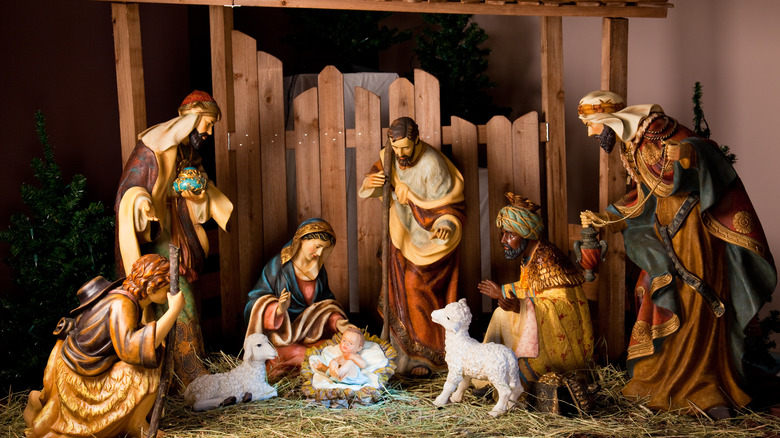The Real Reason We Celebrate Christmas On December 25
In recent history the Christmas season has been overtaken in meaning to reflect more secular sentiments, with a heavy amount of commercialism thrown into the mix (much to the chagrin of those more motivated by religious aspects). Many demographics, including Christians, non-Christians, and the irreligious, have all come enjoy the holiday for their own reasons and celebrate it in their own way. As noted by The Sun, the word Christmas is rooted in the old English "Cristes Measse" ("Christ's Mass"), and its date of December 25 has been used as the day to celebrate the birth of Christ.
Nativity scenes and media reflecting the event commonly center around the winter season to this end. Yet are such displays, and the timing of the day itself, accurate to the Bible? The Gospels in fact give no date for when Jesus was born, and the earliest known efforts to conflate that event with December 25 did not come about until several centuries after his death.
For centuries, Easter was considered more important than Christmas
Theories as to who started this vary. One theory is that the Roman historian Sextus Africanus calculated Christ's conception to have been nine months prior to this date, thus setting a precedent. Another more popular theory is that Emperor Constantine, the first Christian ruler of Rome, chose this date to undermine the preexisting winter holiday of Saturnalia as well as any other winter practices of pagan origin (per Britannica). Either way, this correlation quickly became established as the Catholic Church officially set December 25 as the date of celebration, though many denominations of the Orthodox church celebrate it on January 7, due to adherence to the Julian calendar (via Egyptian Streets).
Yet for centuries, many Christians regarded Easter as the more important holiday, since it was the celebration of Christ's resurrection (via History). It was not until the medieval era that Christmas began to attain a high degree of relevance (via World History Encyclopedia). Furthermore, the holiday's lack of biblical basis for a specific date earned it a fair number of detractors who viewed it as little more than a flimsy excuse to indulge in unholy behaviors. This led to such groups as the Church of Scotland, the Puritans of 17th century England, and the colony of Massachusetts outright banning it.

